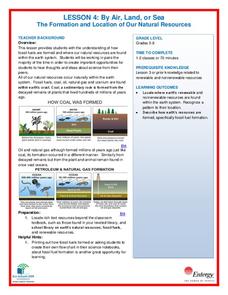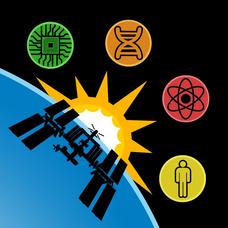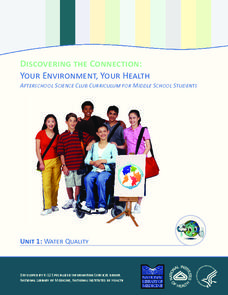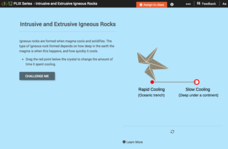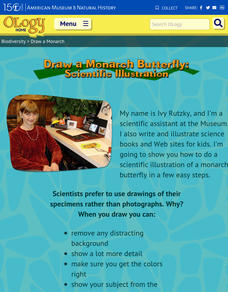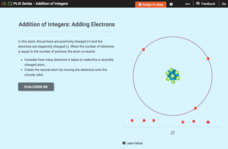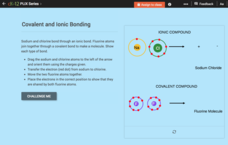National Wildlife Federation
By Air, Land, or Sea: The Formation and Location of Our Natural Resources
Coal forms from the ancient remains of plants that were alive on Earth before the dinosaurs! Scholars use their t-charts from the previous activity over resources and research to determine if their information is correct. Through...
Curated OER
For the Birds
Second graders observe, identify, and document birds sighted at the library feeder station. They observe and document birds in order to begin their birder's life list. They apply scientific concepts and principles by using library...
NASA
Space Station Research Explorer
Take a trip into outer space from the safety of your classroom. A great addition to the digital library of any science teacher, this reference offers a behind-the-scenes look at the research going at the International...
Scholastic
Ready to Research Owls
Researching facts about owls can be a hoot for your class. Let them wisely collaborate on this writing project. The resource is the second part of three parts. It is best to use all three lessons in order.
Curated OER
Use Or Abuse?
Learners explain the meaning of "use value" of nature's resources by researching and writing studenT books personifying an aspect of nature. They produce public service announcements regarding use value for their local community.
Australian Government
The Great Artesian Basin
Covering 23% of the continent and holding 64,900 cubic kilometers of water, the Great Artesian Basin is the primary source of water for much of inland Australia. Using detailed student worksheets, experiments, and case studies,...
Howard Hughes Medical Institute
Survival of the Fittest - Variations in the Clam Species Clamys sweetus
It's not often that you come across a clever laboratory activity that is both imaginative and comprehensive! Using M&M's and Reese's peanut butter candies to represent two different clam species, young biologists test for "relative...
CK-12 Foundation
Rocks: Anatomy of Granite
Get earth science students excited about the formation of rocks with an engaging interactive resource. Learners analyze the composition of granite, then study the various processes that work together to make igneous, sedimentary, and...
National Library of Medicine
Your Environment, Your Health: Water Quality
How important is water quality where you live? The first module in a six-unit series includes four lessons on water quality. By applying the concept directly to the lives of pupils, they engage in meaningful learning. They read about...
Discovery Education
Mood Music!
Grouchy? Sad? Here's a great resource that shows kids how music can be used to lift their spirits. Kids collect and chart data on the effects of music on emotions. After analyzing the results of their experiment, they develop...
Teach Engineering
Earthquakes Living Lab: FAQs about P Waves, S Waves and More
Let's talk about earthquakes .... Using the Internet, pupils research what causes earthquakes, how scientists measure them, their locations, and their effects. The resource is not only informative, but it also builds crucial...
National Library of Medicine
Your Environment, Your Health: Air Quality
Some scientists argue that air pollution now causes more deaths than smoking. The second unit in a six-part series focuses on air quality. Scholars learn what's in the air, how clean the air around their school is, and what they can do...
CK-12 Foundation
Intrusive and Extrusive Igneous Rocks
Check out a resource that's erupting with engaging material! Earth science scholars discover how igneous rocks form in a well-rounded interactive. They manipulate the cooling time of lava to watch crystals form, learn visual...
CK-12 Foundation
Sedimentary Rock Classification: How Old is That Layer?
A timely resource illustrates the effects of the passing years on sedimentary rock formation! Young geologists discover just how long it takes to create shale, slate, and other sedimentary rocks. The interactive also shows...
American Museum of Natural History
Draw a Monarch Butterfly: Scientific Illustrations
One doesn't have to be an artist to appreciate nature. A thorough resource shows pupils how to create detailed illustrations of a monarch butterfly. The lesson highlights the benefits of creating scientific drawings as opposed to simply...
Teach Engineering
Constructing Sonoran Desert Food Chains and Food Webs
Investigate desert biomes by creating food chains and food webs. Groups first research feeding habits of organisms in the Sonoran Desert. This information helps pupils draw food chains and webs to determine relationship between organisms.
CK-12 Foundation
Addition of Integers: Adding Electrons
Young mathematical scientists interact with protons and electrons in an atom to create a neutrally charged atom. They answer questions based on their findings throughout the interactive resource.
CK-12 Foundation
Chemical Bonds: Covalent and Ionic Bonding
Get back to bonding basics. Science scholars get a chance to show what they know using a simple interactive. Pupils create models of covalent and ionic bonds before answering questions about each interaction. The resource includes a...
Chicago Botanic Garden
Weather or Not
What is the difference between weather and climate? This is the focus question of a lesson that takes a deeper look at how weather data helps determine climate in a region. Using weather and climate cards, students decide...
NWT Literacy Council
Readers Theatre Scripts
Engage and entertain young learners with this collection of readers theatre activities. With over 25 different scripts, a wide range of topics are covered from simple counting and rhyming exercises to adaptions of popular children's...
National Library of Medicine
Your Environment, Your Health: Food Safety
Did youknow that chicken causes the greatest risk of food-borne illness. The fourth unit in a six-part series addresses food safety. Scholars research common scenarios of food causing illness through the National Institute for Health....
Curated OER
For the Birds
Second graders explore biology by creating birdhouses. In this bird identification lesson, 2nd graders discuss the different types of birds that live in their environment and what characteristics each type of bird has. Students create a...
Curated OER
Fossil Fuels vs. Alternative Fueling Systems
Fourth graders brainstorm the differences between the fossil fuels that people use in their transportation now and what they could use to minimize greenhouse gas emissions. They use a variety of techniques from webquests to writing...
Star Date
Shadow Play
Three activities make up a solar system lesson that features the sun, its light, and the shadows it produces. Scholars step outside to discover the changes shadows make at different times of day, take part in a demonstration of...
